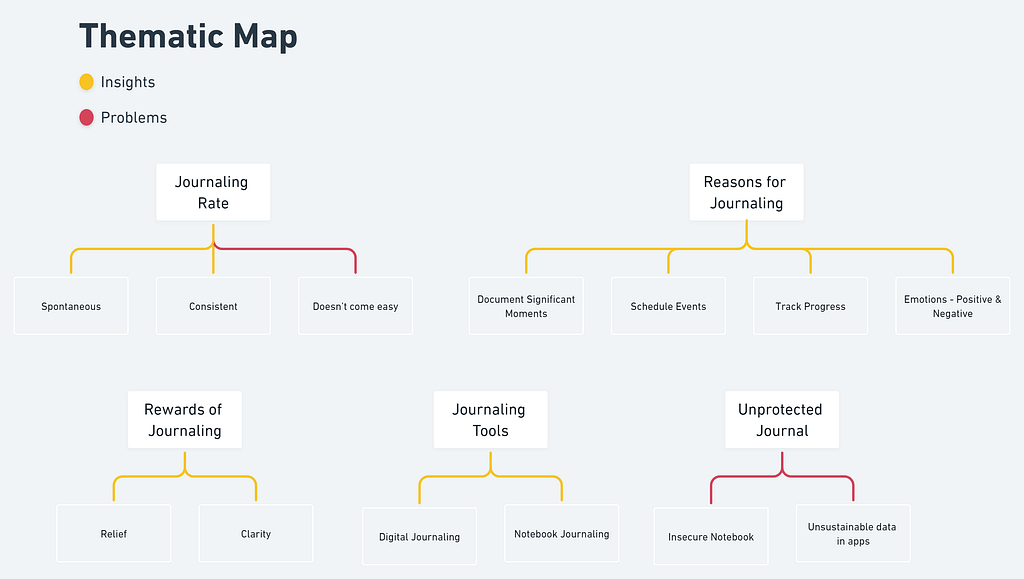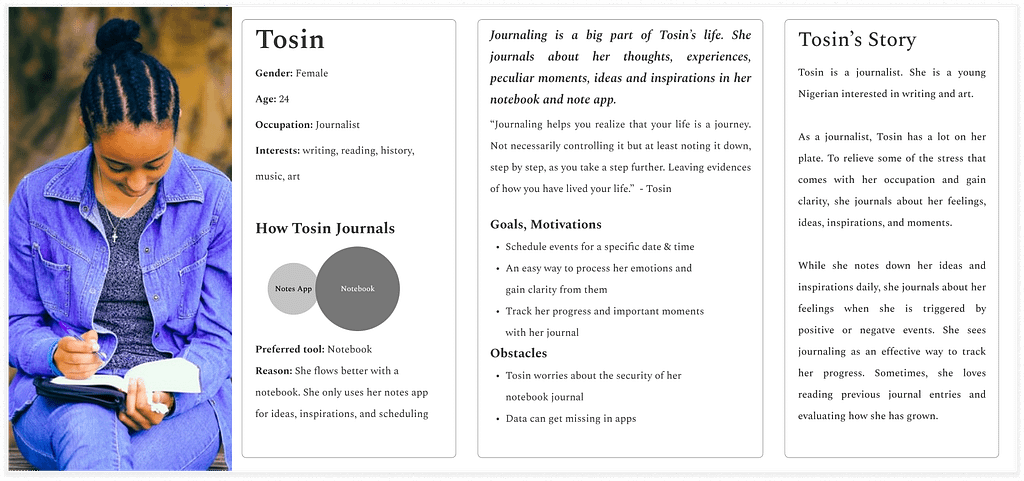TL;DR
- Problem: For some, journaling is crucial to living. I wanted to dig into how 18-35 years olds journaled in order to identify ways to improve the journaling experience.
- Role: UX Researcher.
- Team: 1 UX Researcher.
- Duration: 3 weeks.
- Approach: I conducted five user interviews with participants within the target group that journaled and thematically analysed the data.
- Discovery: I discovered that journaling was a ritual that participants performed when they needed to.
- Outcomes: I recommended solutions that will give people that journal continuity, flexibility and security. If these features are implemented they’ll give journalers a hitch-free experience.
Skip to 💨
About the project
For some, journaling is crucial to living. As a UX Researcher, I wanted to dig into how people between the ages of 18-35 journal, especially what they thought about journaling, their journaling experiences, and how journaling fit their everyday lives. Having taken a few courses at the IxDF, I felt that this would be good practice.
Specifying requirements
Goal
I aimed to understand how the target group journaled in order to identify ways to improve the journaling experience.
I drilled into this study with three goals:
- Describe the attitudes of the target group towards journaling.
- Discover what the target group likes and dislikes about journaling.
- Identified how journaling fits into the daily lives of the target group.
And planned to answer the following questions:
- How does the target group journal? (What tools do they use to journal? How do they use these tools?)
- What motivates the target group to journal?
- What are the problems the target group faces while journaling?
- What role does journaling play in the lives of the target group?
Searching for answers
Note
I realised that my research was generative and sought to gather the experiences and opinions of the target group. There was no better way to do it other than to conduct semi-structured interviews. I ran five of them. Each interview lasted between 20-60 mins. I gave participants the option to attend the interview via a phone call or Google meet.
The process
Recruitment
I resolved to recruit 18-35 years olds who journaled in one way or the other. I had to make sure that as the only UX Researcher I could reach people within the target group. I screened participants based on their age and journaling status.
Interviewing: Journaling habits & motivators
Note
During each interview, the questions centred on the tools participants used to journal, their motivations for journaling, how it affected their daily lives, their experiences with journaling and the problems they encountered while journaling. The interviews let me find that journaling was a ritual that participants performed when they needed to.
Analysis & Synthesis: The religion called journaling
I proceeded to thematically analyse the data.
Note
I began the analysis with no preconceived idea of journaling. I let the data guide my coding. I sifted through and coded each transcript in MS word and themed the codes. I made sure that each theme was relevant to the research questions and goals, and illustrated the data’s story.

This guided me to unearth five themes:

The insights came after. I ensured that the insights I derived from my themes were actionable.

With my insights, I summarised my target group into a persona. This gave me a better sense of the potential users I would be dealing with and a summary of their characteristics.

Insight definition & recommendations
I also brainstormed on each insight, converted them to ‘how might we’ questions, and decided how we might act on them.

Outcomes
Streamlined solutions
This research recommended solutions that are tailored for people who journal. It recommends a flexible, time-saving and accommodating way to journal.
Rewarding research
Although I encountered a few hitches, this project made me realise how rewarding research can be. My empathy with each participant went below the surface. And it was interesting to find how connected our behaviours can be.
Reflections
As the only researcher, I conceived this project to practice my research skills. Along the line, I encountered some challenges.
Research can be messy & chaotic
I faced this issue while trying to gather, analyse, and tell a story with the data. I discovered that the research plan I drafted helped me organise my thoughts and scale past the chaos.
Research is diverse, exciting, & important
I have learned so much from this project. I learnt how to plan and design a research study, how to interview participants, and analyse qualitative data. Perhaps, the most important thing I learned was how diverse, exciting, and crucial research is and how research is good for building empathy with your users.
